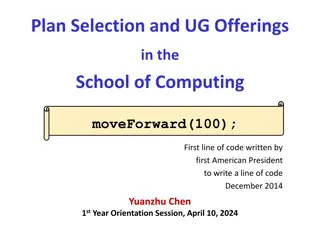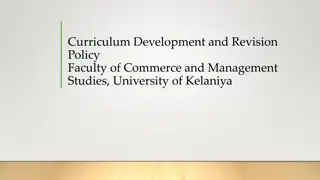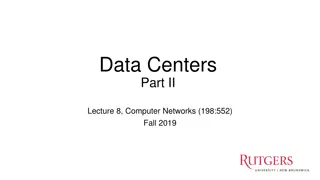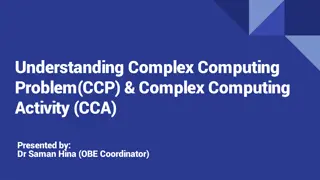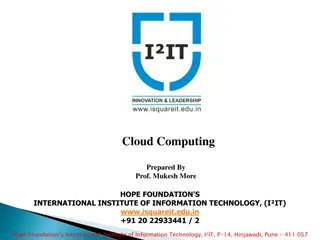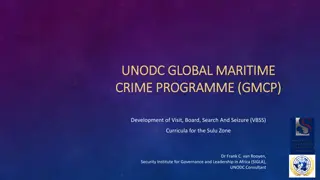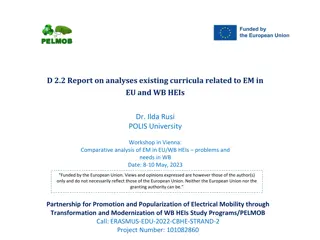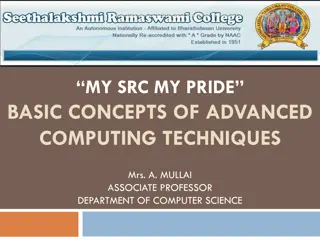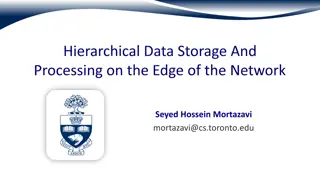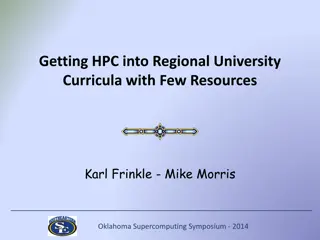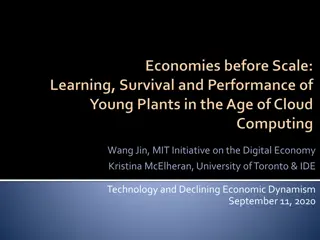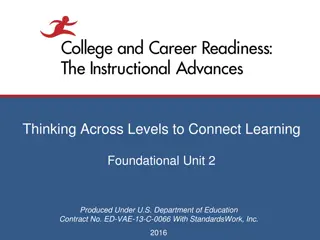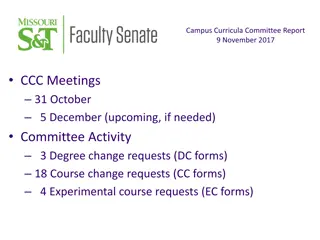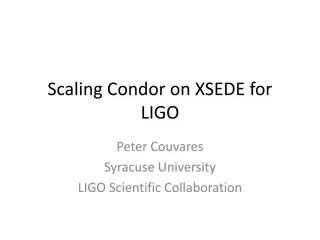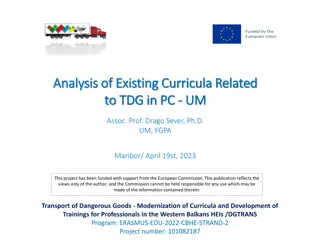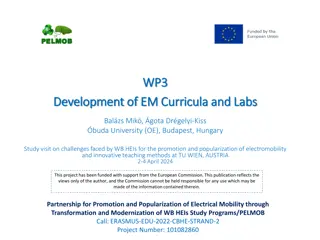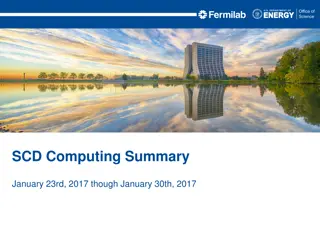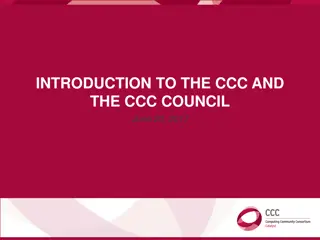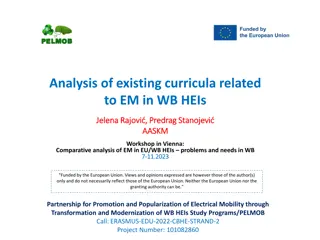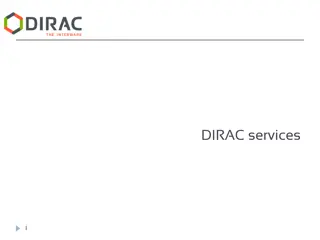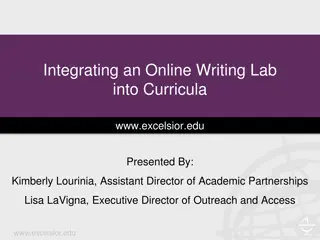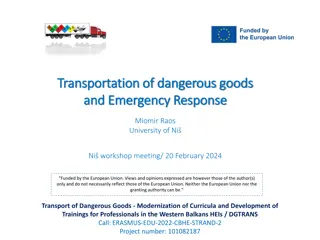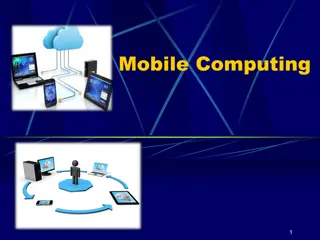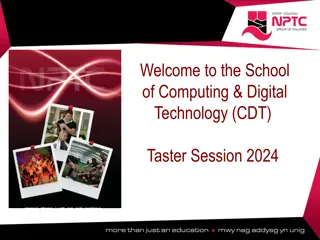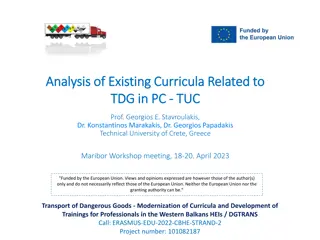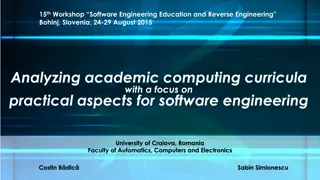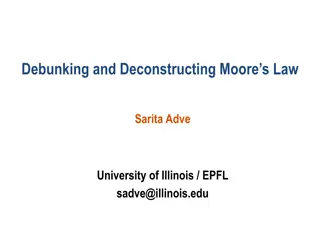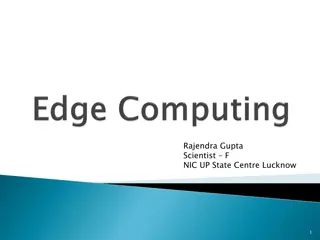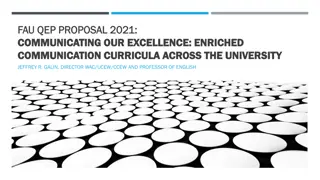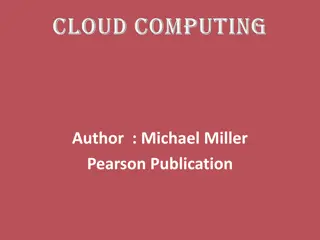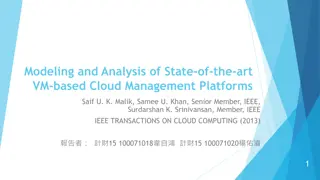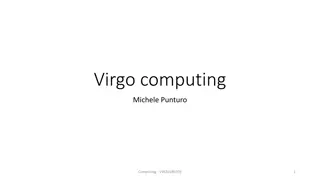Understanding Competency-Based Education in Modern Curricula
Explore the differences between new and old curricula, grasp the concept of theoretical versus competency-based education, and delve into the benefits of competency-based learning. Discover how competency-based education shifts the focus from grades to students' competence in subjects.
4 views • 10 slides
Computing Degree Plans and Offerings at School of Computing
Explore the diverse degree plans and offerings at the School of Computing, including Honours and General degrees, minors, and certificates in Data Analytics. Plan selection is crucial for advancing to second-year courses, with automatic acceptance and pending list options available. Discover the var
0 views • 20 slides
Curriculum Development and Revision Policy at University of Kelaniya
This policy aims to guide the development and revision of degree program curricula at the Faculty of Commerce and Management Studies, University of Kelaniya. It focuses on ensuring quality, timely reviews, assessing program goals, obtaining resources, and aligning with national education policies. T
1 views • 8 slides
Understanding Data Centers and Cloud Computing Technologies
Explore the world of data centers and cloud computing through topics such as data center functionalities, cloud computing advantages, challenges in Data-Center Networks (DCNs), cost breakdowns, server utilization considerations, and more. Delve into the intricacies of managing large-scale computing
0 views • 20 slides
Understanding Parallel and Distributed Computing Systems
In parallel computing, processing elements collaborate to solve problems, while distributed systems appear as a single coherent system to users, made up of independent computers. Contemporary computing systems like mobile devices, IoT devices, and high-end gaming computers incorporate parallel and d
1 views • 11 slides
Understanding Complex Computing Problem (CCP) and Complex Computing Activity (CCA)
Dr. Saman Hina, along with Dr. Farrukh Arif and Dr. Maria Waqas, presents information on Complex Computing Problem (CCP) - a problem involving technical, computing, and other issues with no obvious solution, requiring deep knowledge and analytical thinking. CCP is evaluated through predefined rubric
4 views • 19 slides
Understanding Cloud Computing and Its Components
Cloud computing, offered by the Hope Foundation's International Institute of Information Technology, is Internet-based computing that involves remote servers sharing data-processing tasks and resources. Users can access software without local hardware requirements, empowering them with agility and e
0 views • 15 slides
Development of Visit, Board, Search and Seizure (VBSS) Curricula for the Sulu Zone
The development of VBSS curricula for the Sulu Zone involves creating specialized training programs to enhance maritime security in the region. The aim is to adapt VBSS training to the unique requirements of the Sulu Zone, focusing on aspects such as maritime crime investigation and prosecution. VBS
0 views • 18 slides
Comparative Analysis of Electrical Mobility Curricula in European and Western Balkan Higher Education Institutions
This report analyzes existing curricula related to Electrical Mobility in European and Western Balkan HEIs. The workshop conducted at POLIS University in Vienna highlighted the problems and needs of HEIs in the Western Balkans. The report discusses the organizational structure of POLIS University an
0 views • 11 slides
Exploring Basic Concepts of Advanced Computing Techniques
Delve into the world of advanced computing techniques with Mrs. A. Mullai as she discusses networks, computing, and pervasive (ubiquitous) computing. Discover how networks facilitate data exchange, the role of computing in designing hardware and software systems, and the trend of embedding computati
2 views • 40 slides
Exploring Emerging Technologies in Cloud Computing
Cloud computing revolutionizes accessibility to computing resources through shared pools. Next-generation applications, edge computing, and web applications on the cloud are shaping the future. CloudPath offers a platform for executing third-party applications across distributed data centers. Real-w
0 views • 16 slides
Understanding Cloud Computing, Edge Computing, and Their Applications
Cloud computing entails centralized processing of data on powerful servers, offering scalable resources over the internet. Edge computing brings processing closer to data generation points, reducing latency and enhancing security. Both paradigms cater to different needs such as IoT, autonomous vehic
0 views • 18 slides
Implementing HPC in Regional University Curricula with Limited Resources
Addressing the challenge of integrating High-Performance Computing (HPC) into regional university curricula with limited resources. The presentation outlines goals, essential courses, hardware and software requirements, and approval processes involved. Strategies like utilizing LittleFe clusters and
0 views • 38 slides
Exploring Orto-Computing: Bridging the Gap Between Formal and Phenomenological Computing
Meaningful experiments suggest a transition from the formal, Turing-based approach to a structural-phenomenological one called Orto-Computing. This innovative concept integrates mind-matter interaction and non-formal functions within computational systems, offering potential solutions to complexity
0 views • 18 slides
Impact of Cloud Computing Technology on Young Firms' Performance
The technology shock of cloud computing has significantly influenced the survival and performance of young firms. Young firms face higher uncertainty, benefit from experimentation, and are resource-constrained, making cloud computing's elastic, fast, and generic nature particularly advantageous. Thi
0 views • 21 slides
Coherence in Standards and Curricula: Connecting Learning Levels
Explore the importance of coherence in standards and curricula, focusing on three key advances prompted by the CCR standards. Understand why coherence is vital for college and career readiness, and discover how it impacts instruction and learning progression. Engage in hands-on practices to work wit
0 views • 11 slides
Campus Curricula Committee Report - November 2017
The Campus Curricula Committee met in November 2017 to review degree change requests, course change requests, and experimental course requests. Various changes were requested in disciplines such as Economics, Business Intelligence, Ceramics Engineering, Computer Science, Geology, and Data Science. T
0 views • 5 slides
Scaling Condor on XSEDE for LIGO - Collaborative Computing Project
The project aims to evaluate the utilization of XSEDE resources by LIGO for large-scale computing tasks, with a focus on distributed computing challenges and fostering a research computing community. Various aspects such as political, cultural, and technical narratives surrounding the collaboration
0 views • 28 slides
Analysis of Existing Curricula Related to Transport of Dangerous Goods in Professional Training Programs
This project focuses on the modernization and development of curricula and training programs related to the transport of dangerous goods (TDG) in higher education institutions in the Western Balkans. It examines the structure of study programs, faculty involvement, and specific programs offered by u
0 views • 23 slides
Guide to Developing Digital MicroCredentials from Existing Curricula
Explore the process of transforming existing curricula into focused MicroCredentials to enhance learning experiences in Higher Education. Learn how to analyze, select, design, and describe learning outcomes effectively. Utilize online teaching pedagogies and professional expertise to create a valuab
0 views • 20 slides
Promotion and Popularization of Electromobility: Developing Curricula and Labs in Higher Education Institutions
This project, funded by the European Commission, focuses on enhancing the study programs in West Balkan Higher Education Institutions (WB HEIs) to promote electromobility. Key activities include setting up electromobility laboratories, defining specific competencies and learning outcomes, designing
0 views • 10 slides
Summary of SCD Computing Metrics and Scientific Computing for January 23rd - January 30th, 2017
This summary covers a range of topics related to scientific computing metrics and SCD computing services from January 23rd to January 30th, 2017. It includes details on service areas, offerings, job operations, resource provisioning, database management, system monitoring, and more. The summary also
0 views • 5 slides
Overview of the Computing Community Consortium
The Computing Community Consortium (CCC) was established in 2006 under the Computing Research Association (CRA) to develop a vision for computing research and communicate it to stakeholders. It aims to align computing research with national priorities, encourage high-impact research, and groom new l
0 views • 48 slides
Comparative Analysis of Existing Curricula Related to Electrical Mobility in Western Balkan Higher Education Institutions
This research project funded by the European Union aims to analyze the existing curricula related to electrical mobility in Western Balkan Higher Education Institutions. The study program focuses on preparing students for modern technologies in transportation, traffic safety, planning, logistics, an
0 views • 14 slides
Advanced Cloud Computing Solutions with DIRAC Services
Explore advanced cloud computing solutions offered by DIRAC services at IN2P3, including maintenance, operation, VM scheduling, and contextualization. Learn about dynamic VM spawning, cloud endpoint abstraction, and virtual machine monitoring for efficient resource allocation. Stay updated on the la
0 views • 15 slides
Integrating Online Writing Labs into Curricula: Enhancing Educational Solutions
Discover the benefits and importance of integrating Online Writing Labs (OWLs) into curricula, as discussed by experts from Excelsior College and Purdue University. Explore how OWLs improve writing skills, engage students and faculty, save money, and enhance student success while providing flexibili
0 views • 20 slides
Introduction to Mobile Computing Principles and Designing Mobile Applications
Mobile computing systems involve computing capabilities that can be utilized while on the move, leveraging wireless connectivity, small size, and mobile-specific functionalities. The history of mobile computing traces back to military origins and has evolved with technologies like GPS and wireless t
0 views • 98 slides
Introduction to Boston University's Shared Computing Cluster
Boston University's Shared Computing Cluster (SCC) provides researchers with access to a high-performance computing environment for running code, collaborating on shared data, and utilizing specialized software packages. With over 800 nodes, 20,000 processors, and hundreds of GPUs, the SCC offers re
0 views • 63 slides
Modernization of Curricula for Transportation of Hazardous Materials and Emergency Response Workshop
This workshop, funded by the European Union, focuses on modernizing curricula and developing training programs for professionals in the Western Balkans HEIs on the transportation of dangerous goods and emergency response. Various methods of transporting hazardous materials, such as cargo tanks, chem
0 views • 35 slides
Overview of Task Computing in Parallel and Distributed Systems
Task computing in parallel and distributed systems involves organizing applications into a collection of tasks that can be executed in a remote environment. Tasks are individual units of code that produce output files and may require input files for execution. Middleware operations coordinate task e
0 views • 17 slides
Exploring the World of Mobile Computing
Delve into the realm of mobile computing through this comprehensive presentation outline. Discover what mobile computing is, its applications, challenges, and the future of this technology. Compare mobile networks to wired networks, understand why going mobile is essential, and explore various types
0 views • 106 slides
Explore Computing and Digital Technology Courses at CDT
Discover a range of courses offered by the School of Computing & Digital Technology (CDT) in 4 different colleges. From A-Level Computing to Level 3 Extended National Diploma in IT, the programs provide a blend of theoretical knowledge and practical skills to prepare students for various career path
0 views • 12 slides
Analysis of Existing Curricula Related to Transport of Dangerous Goods in PC - TUC
The analysis focuses on the existing curricula related to the transport of dangerous goods in the context of TUC, highlighting various courses offered by universities in Greece for professionals in the field. The curriculum modernization and training development initiatives in the Western Balkans ar
0 views • 11 slides
Analyzing Academic Computing Curricula for Software Engineering Education
This article delves into the analysis of academic computing curricula with a focus on practical aspects for software engineering education. It covers the yearly curricula for a Bachelor's degree in Computer Science, including courses on computer programming, digital systems design, data structures,
1 views • 24 slides
Exploring the Evolution and Future of Computing: Moore's Law Debunked
Dive into the critical analysis of Moore's Law and Dennard Scaling by Sarita Adve from the University of Illinois, uncovering the shift towards a new era focused on doing more with less in computing hardware and software abstraction. Discover the concept of "Less Law of Computing" and the emphasis o
0 views • 7 slides
Understanding Edge Computing for Optimizing Internet Devices
Edge computing brings computing closer to the data source, minimizing communication distances between client and server for reduced latency and bandwidth usage. Distributed in device nodes, edge computing optimizes processing in smart devices instead of centralized cloud environments, enhancing data
0 views • 32 slides
Transformative Approach to Enriched Communication Curricula at FAU
FAU's QEP proposal aims to enhance communication curricula university-wide through a strategic and sustainable initiative. By building on existing efforts and introducing new methods, they seek to provide high-quality experiences for faculty, staff, students, and the community. The focus is on creat
0 views • 26 slides
Introduction to Cloud Computing: A Comprehensive Overview
Cloud computing, a transformative technology, enables easy access to applications and data from anywhere in the world, promoting collaboration and efficiency. This chapter delves into the fundamentals of cloud computing, distinguishing it from traditional desktop computing and network computing. Und
0 views • 32 slides
State-of-the-art Analysis of VM-based Cloud Management Platforms
This study delves into the modeling and analysis of cutting-edge VM-based cloud management platforms, exploring topics such as cloud computing, cloud structure, types of cloud computing, key features of cloud computing, and examples from the cloud computing industry. It discusses Infrastructure as a
0 views • 40 slides
Overview of Virgo Computing Activities
Virgo computing has been a hot topic recently, with various discussions and meetings focusing on computing issues, future developments in astroparticle computing, and funding for INFN experiments. The activities include presentations, committee meetings, talks, and challenges in computing faced by V
0 views • 34 slides

